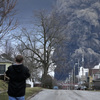
[ad_1]

Ron Fodo, Ohio EPA Emergency Response, appears to be like for indicators of fish and in addition agitates the water in Leslie Run creek to examine for chemical substances which have settled on the backside following a prepare derailment that’s inflicting environmental issues on February 20, 2023 in East Palestine, Ohio.
Michael Swensen/Getty Images
cover caption
toggle caption
Michael Swensen/Getty Images

Ron Fodo, Ohio EPA Emergency Response, appears to be like for indicators of fish and in addition agitates the water in Leslie Run creek to examine for chemical substances which have settled on the backside following a prepare derailment that’s inflicting environmental issues on February 20, 2023 in East Palestine, Ohio.
Michael Swensen/Getty Images
This week, the Environmental Protection Agency (EPA) will maintain a public listening to about its remediation plan for cleansing up chemical substances in and round East Palestine, Ohio. It follows the derailment of a Norfolk Southern prepare carrying hazardous chemical substances like vinyl chloride and butyl acrylate close to the city earlier this month.
Residents have been briefly evacuated from the world two days later to permit for a managed burn of the chemical substances. EPA well being officers have been monitoring the air and water within the space and testing for chemical substances as a part of their ongoing human health risk assessment.
We wished to know: What goes into an evaluation like that? And how does the EPA know if individuals are protected — now and long-term?
To stroll us via that evaluation, we talked to Karen Dannemiller, an affiliate professor of environmental well being science at The Ohio State University.
A multi-step method
The EPA human well being threat evaluation is ongoing and unfolds in 4 steps.
- Hazard Identification – First, the EPA has to determine what chemical substances have been onboard the prepare and launched into the world, and decide which pose a threat to the neighborhood and the atmosphere.
- Dose-Response Assessment – The EPA appears to be like at what the results of every hazardous chemical are at every stage of publicity within the space.
- Exposure Assessment – Once the above steps are performed, the company will study what is thought about exposures — frequency, timing and the assorted ranges of contact that happen.
- Risk Characterization – Here, the EPA primarily items collectively the entire image. They evaluate the estimated publicity stage for the chemical substances with knowledge on the anticipated results for folks in the neighborhood and the atmosphere. They additionally describe the dangers, which form the security pointers.
Throughout the approaching days and months, there might be a lot uncertainty. Assessments are ongoing, knowledge takes time to gather and course of, and outcomes and clean-up take time.
For Dannemiller, each working in the direction of understanding these dangers and acknowledging the uncertainties that exist all through this course of is important. That transparency and accountability is what’s going to assist the neighborhood heal.
Further assets and knowledge
- Read EPA updates on the Ohio derailment
- Read the EPA’s proposed remediation plan
- Phone quantity totally free, personal water testing: 330-849-3919
Listen to Short Wave on Spotify, Apple Podcasts and Google Podcasts.
You can at all times attain us by emailing shortwave@npr.org.
This episode was produced by Margaret Cirino, edited by Rebecca Ramirez and fact-checked by Anil Oza. Hans Copeland was the audio engineer.
[adinserter block=”4″]
[ad_2]
Source link

